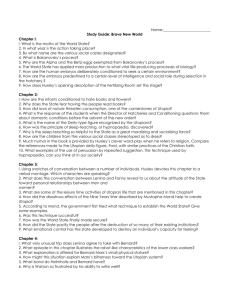

It made a deep impression on me, though I didn't fully understand some of what I was reading. I first read Brave New World in the early 1950s, when I was 14. What sort of happiness is on offer, and what is the price we might pay to achieve it? Surely it's time to look again at Brave New World and to examine its arguments for and against the totally planned society it describes, in which "everybody is happy now". Would it be possible for both of these futures - the hard and the soft - to exist at the same time, in the same place? And what would that be like? On the wilder fringes of the genetic engineering community, there are true believers prattling of the gene-rich and the gene-poor - Huxley's alphas and epsilons - and busily engaging in schemes for genetic enhancement and - to go one better than Brave New World - for immortality. Shopping malls stretch as far as the bulldozer can see. On the other hand, Brave New World hasn't gone away. The Ministry of Love is back with us, it appears, though it's no longer limited to the lands behind the former iron curtain: the west has its own versions now. Thoughtcrime and the boot grinding into the human face could not be got rid of so easily, after all.

That picture changed, too, with the attack on New York's twin towers in 2001. True, promiscuity had taken a hit from Aids, but on balance we seemed to be in for a trivial, giggly, drug-enhanced spend-o-rama: Brave New World was winning the race. But when the Berlin Wall fell in 1989, pundits proclaimed the end of history, shopping reigned triumphant, and there was already lots of quasi-soma percolating through society. During the cold war, Nineteen Eighty-Four seemed to have the edge. The other was Aldous Huxley's Brave New World (1932), which proposed a different and softer form of totalitarianism - one of conformity achieved through engineered, bottle-grown babies and hypnotic persuasion rather than through brutality, of boundless consumption that keeps the wheels of production turning and of officially enforced promiscuity that does away with sexual frustration, of a pre-ordained caste system ranging from a highly intelligent managerial class to a subgroup of dim-witted serfs programmed to love their menial work, and of soma, a drug that confers instant bliss with no side effects.


 0 kommentar(er)
0 kommentar(er)
